Last week, as we talked about The Father, I ignored something obvious: I’ve been Orthodox for 32 years, and I forgot iconography!?
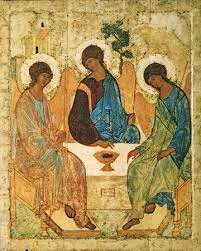
God the Father has no physical attributes and so cannot be depicted, nor can the Holy Spirit. Only Jesus Christ can be portrayed. So the classical icon of God the Holy Trinity is the one by Andrei Rublev (Sixteenth Century) where all three are shown symbolically, using the three “men”, “the Lord”, “the angels” who visited Abraham and Sarah. Genesis 18 and 19 In the icon, which of the Three is the Father? The One on the left, towards Whom the other Two incline their heads, since the Lord taught that the Son is begotten of the Father, and the Spirit proceeds from the Father.
above: by permission of Saint Isaac’s Skete at skete.com
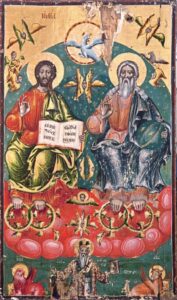 Were you expecting the Father to look older? Here is another (very misleading) icon of the Trinity which shows why not. I include it here for illustrative purposes only. It shows the Father as an old man, and the Son as a young man.
Were you expecting the Father to look older? Here is another (very misleading) icon of the Trinity which shows why not. I include it here for illustrative purposes only. It shows the Father as an old man, and the Son as a young man.
No! Both are eternal. This comes perilously close to the heresy of Arius who taught that “there was a time when the Son was not”, that the Son is younger than the Father and therefore not eternal. Nor, by the way, should the Holy Spirit be depicted as a bird. He took the form of a dove once at the time of Christ’s Baptism, but in essence He also has no form and cannot be imaged.
Now, moving on to today’s topic:
Who
You’d think we could take the word “who” for granted. God is our Father, which means He’s personal, never deals with us in an impersonal way. (This, by the way, also applies to the Holy Spirit, who is never an impersonal “It”.)
But let’s dig a little deeper, even though we won’t know what to do with it once we get there. Remember that none of our words for God are adequate to His Reality. That applies also to our word “person”. God is more than a Person. He is “super-Personal”. What does that mean? We haven’t the faintest idea. An analogy: Mathematicians can calculate in more than our three dimensions, but our experience cannot grasp what they are like. God is like that, beyond our dimensions and our understanding. We’re going to hit on that theme again and again today.
Art (Is)
Actually this word isn’t in the Greek text! but it is implied – and since we pray it, let’s talk about it. Hang on, for this will be like the movie “Back to the Future”, only worse – or actually better.
God simply is. He is eternal. He created time. He is “beyond” time, “outside” time, so to speak. Or to put it another way, He has all times within Himself. In relation to our time, God has always been and always will be, “now and ever and unto ages of 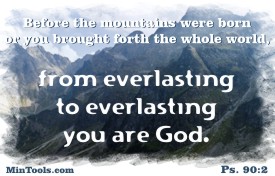 ages”. But God Himself has no past, no future. He lives in the eternal present, the eternal “now”. This means God is now present in our past. He is now present in our future. He doesn’t have to look back or ahead. All things that have ever been and ever will be in Heaven and on earth lie present before Him now.
ages”. But God Himself has no past, no future. He lives in the eternal present, the eternal “now”. This means God is now present in our past. He is now present in our future. He doesn’t have to look back or ahead. All things that have ever been and ever will be in Heaven and on earth lie present before Him now.
Does this mean He sees and knows your future? Yes. Does this mean He controls your future? No. He has given you free will to choose. It just means He’s already up ahead there, seeing what you will choose – and rejoicing or weeping about it, so to speak, now.
This is one of the ways in which, to a small extent, we human beings are created in the image of God. We also possess no past or future. The only thing we possess, the only thing we actually have, is “now”. Let’s chase that thought further some other time.
In Heaven
You thought this was going to be simple, didn’t you? Sorry.
Our English version is a slight mistranslation. The Greek is actually ἐν τοῖς οὐρανοῖς, in the heavens. “Our Father, who is in the heavens.”
As in Greek, so in English, the word “heaven” can mean “the sky above us”, or “God’s eternal world”. This has led to some confusion. The early Christians certainly understood that when “a cloud hid [Christ] from their sight” and He ascended (see Luke 24, Acts 1) it didn’t mean He was literally going up like a rocket ship. (Pardon the imagery, but see below.)
Some religious art has portrayed a whole lot more than the Scriptures describe, and has contributed to the confusion.
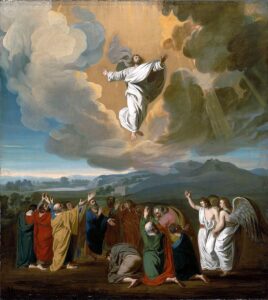
The Ascension, (John Coppley, 1775)
The ancient Greeks (which thereby included the Fathers) believed that the dome of the sky lay at an infinite distance from the earth. * They knew that if Christ had literally gone up, He would never get there. They understood the symbol: He was returning now with his Body into that “dimension” (as we now might say) from where He had come. That is, to the highest heaven, “above” the dome, “beyond” our cosmos, and apparently as we shall hear, above the “highest heavens”. We’re talking “beyond” our time and space, so to speak.
- This, by the way, is not far different from what astrophysicists now believe.
Back to the Prayer: “in the heavens“. The heavens? How many heavens are there? Seven, to be precise. This was common understanding in the ancient world. Saint Paul in 2 Corinthians 12 boasts of “a man” (surely himself) who was “caught up to the third heaven”, and into “paradise”. What is the third heaven? Is it to be distinguished from paradise? What was it like? He says he couldn’t say, or was forbidden to say – which leaves us in considerable confusion! except that it may help us to begin to understand what is meant by “Our Father, who are in the heavens.”
Later Saint Paul wrote that “He who descended is the same also Who ascended up far above all heavens, that he might fill all things.” Ephesians 4:10 The Epistle to the Hebrews says that Christ “passed through the heavens”. Hebrews 4:14)
But, on the other hand, God is everywhere, not limited by dimensions. He must be present here in our cosmos, here on earth. Were it not for His presence and power and order, moment by moment, we and all things here would cease to be, revert to the non-existence out of which He created us and creates us now. “It is a mystery!” – the Orthodox solution to everything.
However, here, I think, is the “practical” application of it all:
Where can I go from Your Spirit?
Or where can I flee from Your presence?
If I ascend into heaven, You are there;
If I make my bed in hell, behold, You are there.
If I take the wings of the morning,
And dwell in the uttermost parts of the sea,
Even there Your hand shall lead me,
And Your right hand shall hold me.” Psalm 139:8-10
And here is what Father Lawrence Farley wrote:
“We are not speaking the language of arithmetic, but of metaphor. This is theology, not astronomy. The point of the theological metaphor is the transcendence of God. God is not just “up there”. He is greater than that. And He is not just “up above up there”. He is higher still. There are many heavens, and God is above them all. In fact He is so exalted that He has to humble Himself to see what goes on in heaven as well as on earth.” (Psalm 113:6)
Perhaps I should have begun with that last paragraph and with Psalm 139 and left the rest out. If you wish, please just go back and un-read everything I wrote.
Hallowed
I trust you know where the name “Hallowe’en” came from? (If you do, you may skip this paragraph.) But just in case: It’s a conflation of the words “Hallow” and “Even”. “Hallow” means “holy” or “saint”. “Even” was the old English word for evening. In the Western calendar October 31 is the Eve of All Hallows Day (All Saints Day).
“Hallowed” (holy) means sacred, consecrated, set apart from the ordinary. God is most definitely “set apart from the ordinary”: He “alone has immortality, dwelling in unapproachable light, whom no man has seen or  can see, to whom be honor and everlasting glory.” 1 Timothy 6:16
can see, to whom be honor and everlasting glory.” 1 Timothy 6:16
God is infinite, knowing no bounds. He is eternal, without beginning or end. God is unknowable by human reason. He is ineffable: no words are adequate to describe Him. (Even “unapproachable light” is only a symbol, pointing to the Truth.) God is incomprehensible: we cannot enter His mind and understand His ways. He is entirely set apart from this world, His creation, and from us His creatures, in the same way that artists are set apart from their paintings, as composers from their music, as authors from their novels. God is utterly sacred, holy.
God’s holiness is something we dare never forget. In some contemporary circles (I’m sure they mean well) you’d get the feeling that God might be a country and western star, or a nice grandpa upstairs or a therapist hired to make us feel good, or a heavenly counsellor who always stands by to give us on the spot information about whatever… I recently came across a video entitled (no kidding) “I asked God for advice about the Vaccine, and here’s what He just told me”. (Don’t look it up.) And in some places God definitely seems to be an “ordinary guy”, which must be why the pastor stands up front in his blue jeans with his guitar praising God or Somebody. (Picture your priest at the altar, wearing blue jeans, strumming his guitar and singing … … OK. Stop picturing it now. Please.)
I say this not to criticize, but to warn: Please do not fall into this secular pop religion with its attempt to “cozy up” to the all holy God. Thank the Fathers and our holy Orthodox Tradition that our Divine Liturgy protects us from this. Walk into an Orthodox Church or attend Divine Liturgy with its beauty – the color, the icons which surround us, the mysterious chanting, the smell of incense, the ceremony, the pageantry – and it’s immediately obvious that here is a place where people encounter Something, Someone utterly beyond our ordinary day to day world: Our holy God. The Kingdom of Heaven.
from “Orthodox Christian Chants” in Greek. It’s in English just below.
And yet, almost seeming to contradict what I just said… we Orthodox also find in church a wonderful closeness with God. Someone described it like this: At worship, Orthodox are “at home in Heaven” – sometimes a bit too much so, I think! (Do non-Orthodox experience this? I don’t know. I know I didn’t till I’d been here a little while.)
“At Home in Heaven”?
How can this be? If God is all-holy, completely separated from His world and from us, how can it be that we know Him even well enough to speak of Him, to worship Him, to praise Him? let alone to feel close to this All-holy One “whom no man has seen or ever 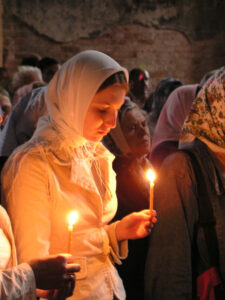 can see”? How can we know this unknowable God in church, in our worship, in our prayer at home, in our fellowship with our brothers and sisters in the Church?
can see”? How can we know this unknowable God in church, in our worship, in our prayer at home, in our fellowship with our brothers and sisters in the Church?
courtesy of Pravmir
The answer: Unless God had decided to reveal Himself and his holiness to us, we would not. God is knowable because He chose to make Himself known to us. He is describable, to a very inadequate extent, because He Himself gave us words to speak of Him.
How can we be close to Him, though in His essence He remains completely set apart from us, unapproachable? It is because – wonder of wonders! – He chose to become part of His creation in our Lord and God and Savior Jesus Christ. God’s holy Kingdom on high would remain utterly inaccessible to us, except that He then shared His holiness with us, made us part of it.
When we were Baptized, we were incorporated into the Body of Christ, his holy Church, and we were given eternal life in the Kingdom of Heaven. We 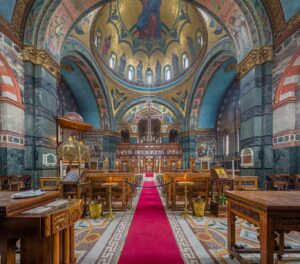 were “set apart”. Therefore, at the Divine Liturgy, the priest censes holy things: the altar, the Holy Gifts of Bread and Wine, the holy saints in the holy icons, and then us, the holy people of God. We also are holy icons (“images”), created in the image of God.
were “set apart”. Therefore, at the Divine Liturgy, the priest censes holy things: the altar, the Holy Gifts of Bread and Wine, the holy saints in the holy icons, and then us, the holy people of God. We also are holy icons (“images”), created in the image of God.
Above: Saint Sophia’s Greek Orthodox Cathedral, London, UK (Photo by DAVID ILIFF. License: CC BY-SA 3.0)
Then, before we receive the Holy Eucharist, the priest says “Holy things for the Holy [people of God]”. Again, that’s us. We are holy with the holiness He has already given us. We are tarnished icons, God knows, but in His Church He is cleaning us up. We are sacred, set apart from this world. “For our citizenship is in heaven, from which we also eagerly wait for the Savior, the Lord Jesus Christ,who will transform our lowly body that it may be conformed to His glorious body…” Philippians 3:20-21
This is why the secular world (whether “right” or “left”) will never understand us. It’s because we live in a world of our own. (I mean that in the nicest possible way!) What we are, deep in our being, is unknowable, inaccessible, beyond understanding to the outside world. This is because our standards are not the world’s standards. Our life is not the world’s life. Our homeland is no land on earth. ” For our citizenship is in heaven”.
Am I describing the ideal? Yes, obviously! None of us live it out perfectly. Sometimes we don’t even come close. But it is a real ideal, a Reality always before us. It is “who we are”
And by the grace of God, we are already a little like our all-holy Lord Jesus, who is the image of His all-holy Father. And in the End, if we will have it, “we shall be like Him, for we shall see Him as He is”. 1 John 3:2 Which means we also shall be “all-holy”.
In what I wrote above, I’m not trying to exclude any non-Orthodox here present who find things that relate to you. By no means. I’m just trying to answer the question we began with:
Why in our “unworldly” churches and at our “super-worldly” Divine Liturgy do we Orthodox feel so much “at home in Heaven”? It’s because that’s where we belong.
from “Orthodox Christian Chants”
And there we’ll have to stop. This post is already too long. But we should all be proud. This week we covered five words, a great improvement over last week’s two!
Next Week: Hallowed be Thy Name. Thy Kingdom come…
Week after next: Give us this day our daily bread – which also is a slight mistranslation.
Thank you for this wonderful article. It spoke directly to my heart.
That’s because the subject matter speaks directly to my heart. God bless you, Georgina.